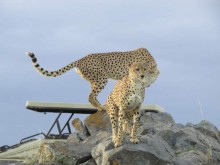Private guide in Mombasa, guided tours in Mombasa, Kenya

Mombasa
Kenya
Language: English
Currency: Kenyan shilling (KES)
Information about Mombasa
What makes Mombasa in Kenya attractive for tourists?
Mombasa is Kenya’s second-largest city and the country’s main seaport, located on the scenic shores of the Indian Ocean. This coastal resort city combines pristine white-sand beaches, a rich Swahili cultural heritage, and Arab, Indian, and colonial influences, along with a vibrant urban atmosphere. Known as the "Pearl of the Coast," Mombasa offers sun, sea, history, and warm hospitality. It is one of Kenya’s most popular tourist destinations, attracting millions of visitors each year.
The city suits both beach holidays and cultural tourism. Here, you can explore ancient fortresses, visit local markets, taste exotic seafood, and go on safaris or diving excursions. Mombasa also serves as a transit hub for nearby resorts such as Diani and Watamu, as well as the Lamu Archipelago. Thanks to its location, infrastructure, and diverse attractions, Mombasa is ideal for families, couples, and solo travelers alike.
What attractions should you visit in Mombasa?
- Fort Jesus — a historic Portuguese fortress and UNESCO World Heritage Site.
- Diani Beach — a long, palm-lined beach with crystal-clear waters.
- Mombasa Marine National Park — coral reefs and a rich underwater ecosystem.
- Victoria Market — a traditional market with seafood, spices, and souvenirs.
- Juma Mosque — one of the oldest mosques in East Africa.
- Fort Jesus Museum — exhibits on Swahili culture, history, and regional life.
- Mango Island — a scenic island perfect for picnics and snorkeling.
- Palm Grove — a shaded promenade along the waterfront for relaxing walks.
- Hallakalaka Nature Reserve — a rare mangrove forest sanctuary with birds and wildlife.
- Sea Turtle Eco-Center — a rescue and release center for endangered sea turtles.
Why is it better to explore Mombasa with a private guide rather than independently?
Private guides in Mombasa have in-depth knowledge of marine routes, local history, and cultural traditions. They help organize safe diving trips, explain the significance of landmarks, and lead you to secluded beaches and islands. Without a guide, it's difficult to navigate marine parks or access exclusive excursions. A private guide in Mombasa ensures your trip is not only safe but also enriching — tailoring the itinerary to families, divers, or explorers.
When is the best time to visit Mombasa and what is the climate like?
The best time to visit is from June to October and from December to February. These dry season months offer sunny skies and warm sea temperatures — perfect for beach holidays and diving. The climate is tropical: daytime temperatures range from +28–32°C, with mild nights at +22–25°C. The wet season (March–May and November) can be rainy, but with fewer tourists and lush greenery.
What languages are spoken in Mombasa and what local food should you try?
The main languages are English, Swahili, and some Arabic or Indian dialects due to historical trade. English is widely used in tourist areas. Must-try dishes include fresh prawns, squid, swordfish, coconut-based soups, and fruit smoothies. Don’t miss local spices like curry, ginger, and parsley.
Is there shopping in Mombasa and what souvenirs should you bring home?
Shopping centers around the main market and beachside souvenir stalls. You can buy hand-carved wooden masks, shell jewelry, kanga fabrics, ceramics, and artificial coral crafts. Items prohibited for export include natural coral, turtle shells, rare seashells, and protected plants.
What clothing and footwear should you pack for Mombasa?
Light, breathable clothing is recommended: dresses, shorts, swimwear. Footwear should include sandals or aqua shoes. For evenings, bring a light beach dress or shirt. When visiting mosques, wear modest clothing covering shoulders and knees.
What currency is used in Mombasa and should you exchange money?
The official currency is the Kenyan shilling (KES). US dollars and euros are accepted in tourist areas, but local currency is better for small purchases. Exchange at banks or licensed bureaus. Credit cards are accepted in hotels and larger stores.
What are the rules of conduct in public places in Mombasa?
Respect local customs: always ask permission before photographing people, especially during ceremonies. Avoid loud behavior and public displays of affection. Dress modestly at mosques and villages. Tipping is customary for guides and in restaurants.
How safe is Mombasa and what issues might tourists face?
Mombasa is generally safe, but petty theft can occur in crowded areas. Avoid walking alone at night. Main risks include sunburn, dehydration, and jellyfish stings. Use sunscreen, drink plenty of water, and avoid swimming in restricted zones.
What to do in Mombasa in the evening and is it suitable for children?
In the evenings, enjoy dinner at a seaside restaurant, attend a cultural show, or take a walk along the lit-up waterfront. Children will love island picnics, the eco-center, and beach games. Many private guides in Mombasa offer family-friendly educational programs.
Who lives in Mombasa, what religions are practiced, and what is the ecological situation?
The population is around 1.2 million. Main ethnic groups include Swahili, Luhya, and Kalenjin. Religions include Islam, Christianity, and traditional beliefs. The ecology is under threat from ocean pollution, but active programs are underway to protect coral reefs and sea turtles.
How to get to Mombasa: which city and airport should you fly to?
Fly into Jomo Kenyatta International Airport in Nairobi or directly into Moi International Airport in Mombasa. From Nairobi, Mombasa is about 500 km away. You can reach it by bus (6–7 hours), train (the modern Madaraka Express), taxi, or private transfer with a guide from Kenya.
Why should you choose private guides in Kenya?
Private guides in Kenya ensure safety, cultural immersion, and flexible itineraries. They help you experience Mombasa through the lens of marine life, history, and local culture. Choosing private guides in Mombasa and private guides in Kenya guarantees a rich, secure, and authentic journey.
Why should Mombasa be part of your Kenya trip?
Mombasa offers a unique blend of beach relaxation, history, and ocean adventures. Here, you can enjoy the beauty of the Indian Ocean, learn about ancient seafarers, and still feel safe and welcomed. This city is perfect for travelers seeking not just sights, but deep, personal experiences.
5 Reasons to Visit Mombasa
- One of Kenya’s best spots for beach holidays and diving.
- Fort Jesus — a UNESCO World Heritage Site.
- Beautiful white-sand beaches and vibrant coral reefs.
- Ideal destination for family and eco-tourism.
- Proximity to national parks, Lamu Islands, and resorts like Diani and Watamu.
Our Tips for Tourists in Mombasa
- Book your dive safari in advance — popular reefs fill up quickly.
- Bring a waterproof phone case — perfect for underwater photos.
- Don’t forget your passport when visiting coastal reserves and protected zones.
- Take a photo at Fort Jesus — a city landmark.
- Support eco-projects — participate in a sea turtle release.



 French
French Spanish
Spanish Russian
Russian












